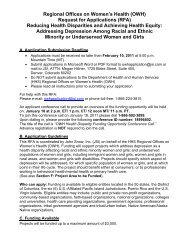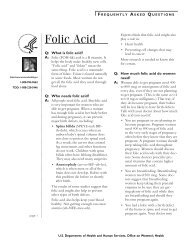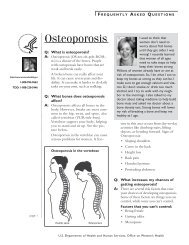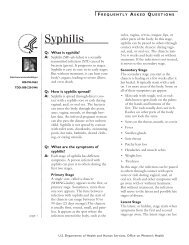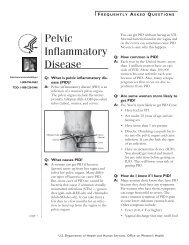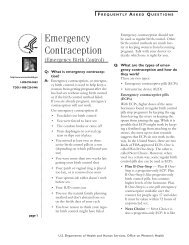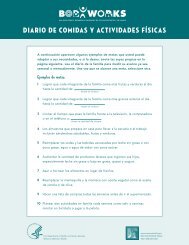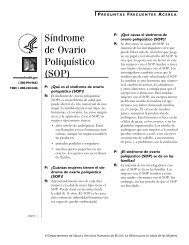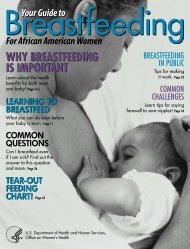Human Papillomavirus (HPV) and Genital Warts - WomensHealth.gov
Human Papillomavirus (HPV) and Genital Warts - WomensHealth.gov
Human Papillomavirus (HPV) and Genital Warts - WomensHealth.gov
Create successful ePaper yourself
Turn your PDF publications into a flip-book with our unique Google optimized e-Paper software.
F r e q u e n t l y As k e d Qu e s t i o n s<br />
http://www.womenshealth.<strong>gov</strong><br />
1-800-994-9662<br />
TDD: 1-888-220-5446<br />
And even after the warts are treated,<br />
the <strong>HPV</strong> virus may remain. Using condoms<br />
may reduce your risk of passing<br />
on genital warts.<br />
Q: How does <strong>HPV</strong> affect a<br />
pregnancy?<br />
A: Most women who had genital warts,<br />
but no longer have them, do not have<br />
problems during pregnancy or birth.<br />
For women who have genital warts<br />
during pregnancy, the warts may grow<br />
or become larger <strong>and</strong> bleed. In rare<br />
cases, a pregnant woman can pass <strong>HPV</strong><br />
to her baby during vaginal delivery.<br />
Rarely, a baby who is exposed to <strong>HPV</strong><br />
gets warts in the throat or voice box.<br />
If the warts block the birth canal, a<br />
woman may need to have a cesarean<br />
section (C section) delivery. But <strong>HPV</strong><br />
infection or genital warts are not sole<br />
reasons for a C section.<br />
Q: How can I be sure that I don’t<br />
get cervical cancer?<br />
A: While there are no sure ways to prevent<br />
cervical cancer, you can lower your risk<br />
by:<br />
• Getting regular Pap tests. The<br />
best time to get a Pap test is 10 to<br />
20 days after the first day of your<br />
last period. Don’t have the test done<br />
during your period. Also, for 2 days<br />
before your Pap test don’t have sex<br />
or use douches, vaginal medicines<br />
(unless your doctor tells you to), or<br />
spermicides. Talk to your doctor<br />
about how often to get Pap tests.<br />
• Not smoking. Smoking can raise<br />
your risk of cervical cancer.<br />
• Being faithful. This means you <strong>and</strong><br />
your partner only have sex with each<br />
other <strong>and</strong> no one else.<br />
• Using a condom EVERY time<br />
you have vaginal, anal, or oral<br />
sex. Condoms don’t always protect<br />
you from <strong>HPV</strong>. But they may reduce<br />
your risk of getting genital warts <strong>and</strong><br />
cervical cancer. n<br />
page 5<br />
U.S. Department of Health <strong>and</strong> <strong>Human</strong> Services, Office on Women’s Health





